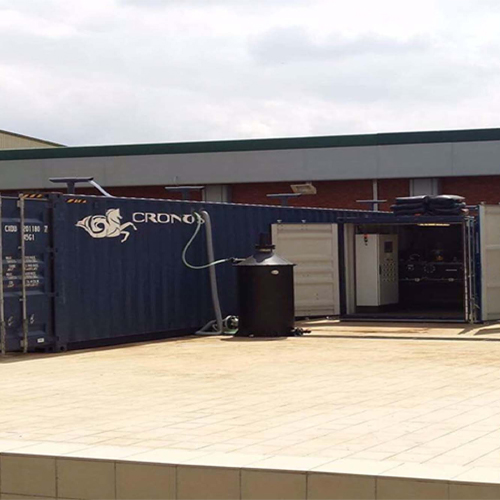The Versatility of Containerised Effluent Treatment Plants

In a world increasingly conscious of environmental impact, efficient wastewater management is a priority across many industries.
One innovative solution that has gained traction is the use of containerised effluent treatment plants. These compact and versatile units are changing how we approach wastewater treatment, offering a range of applications that address environmental concerns while catering to practical needs.
In this blog, we’ll take a more in-depth look at where containerised effluent treatment plants can be applied.
Understanding Containerised Effluent Treatment Plants
Containerised effluent treatment plants are self-contained systems designed to treat wastewater in a controlled environment. What sets them apart is their modular structure. They are housed within standard shipping containers, making them easily transportable and adaptable to different settings. These 'plug and play' solutions can also either augment existing systems that are overstretched or provide a brand new treatment system. Containerised systems have the necessary components for treating wastewater, including physical, chemical, and biological treatment processes.
Applications Across Industries
Industrial Facilities
Industries generate a significant amount of wastewater with varying levels of contaminants. Containerised effluent treatment plants can be swiftly deployed to industrial sites, allowing for on-site treatment that reduces the environmental impact. These units are designed to handle diverse effluent types, from chemical and petrochemical wastewater to food and beverage processing effluents.
Remote and Temporary Camps
Establishing a traditional wastewater treatment facility in remote areas or during short-term projects, such as construction or mining, is neither practical nor cost-effective. Mobile treatment plants can provide an efficient solution, ensuring proper wastewater treatment without requiring complex infrastructure development.
Disaster Relief Operations
During natural disasters or emergencies, sanitation and wastewater treatment become critical for preventing the outbreak of diseases. Containerised plants can be swiftly transported to disaster-stricken areas, delivering clean water and reducing the risk of contamination.
Agricultural Operations
Agriculture relies heavily on water, but it also generates substantial amounts of wastewater due to processes like irrigation and livestock farming. Containerised treatment plants allow farmers to treat agricultural runoff and reuse water for irrigation, which conserves water resources.
Residential Complexes and Resorts
In areas with inadequate centralised wastewater treatment systems, containerised units can serve as decentralised solutions for residential complexes, resorts, and recreational facilities. They can treat wastewater locally, reducing the strain on existing infrastructure and preventing pollution of nearby water bodies.
Event Management
Significant events like festivals, concerts, and sporting events can put increasing strain on local sanitation systems. Temporary containerised treatment plants can be deployed to manage the sudden influx of wastewater effectively, ensuring the event's success without harming the environment.
Benefits of Containerised Effluent Treatment Plants
Mobility and Flexibility
Containerised units can be easily transported to different locations, making them ideal for situations where wastewater treatment needs are temporary or change frequently. This mobility also facilitates their use in remote or challenging environments.
Rapid Deployment
Traditional wastewater treatment facilities can take months or even years to plan and construct. In contrast, containerised plants can be operational within a much shorter timeframe, addressing urgent wastewater management needs swiftly.
Cost-Efficiency
The modular nature of containerised plants reduces the initial investment required compared to building permanent treatment facilities. They also offer operational cost savings due to their efficient treatment processes and lower energy consumption.
Environmental Sustainability
By treating wastewater at or near the source, containerised plants minimise the need for long-distance transportation of untreated effluent. This helps prevent the pollution of water bodies and reduces the carbon footprint associated with wastewater transportation.
Scalability
It is possible to scale a containerised plant up or down based on the volume of wastewater generated, ensuring optimal treatment efficiency without overburdening the system.
Compliance and Regulations
Industries and facilities must adhere to strict wastewater treatment regulations. Containerised units can be customised to meet specific compliance requirements, ensuring that treated effluent meets the necessary standards before discharge.
A New Era of Wastewater Management
The way industries manage the treatment of their wastewater is evolving all the time. Containerised effluent treatment plants offer an adaptable and efficient solution for various applications. From remote mines to bustling urban centres, their mobility and flexibility make them a valuable asset. As technology advances, these modular units will become even more sophisticated, contributing to a cleaner and more sustainable future.





















